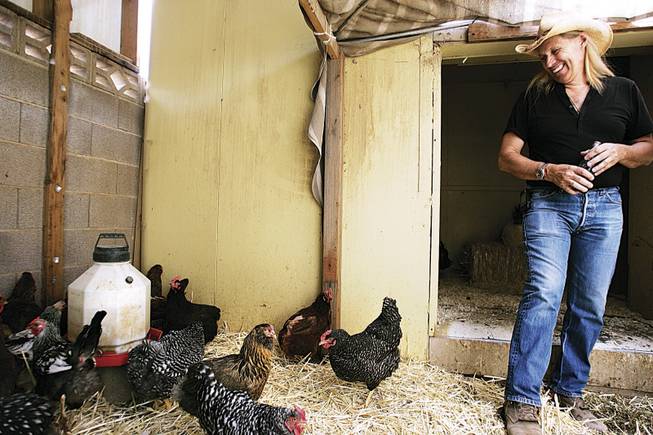
Balinski, 58, endured a measure of snickering and the questions of several members of county government in his quest to keep 50 chickens on his 1.1-acre spread on Gilespie Street in the southern part of the Las Vegas Valley. Balinski’s always raised poultry, but the sagging economy has given him even more motivation to do so.
Saturday, May 9, 2009 | 2 a.m.
Sun Archives
- On the road back to work (4-11-2009)
- Budget panel releases $6 million for worker training (4-3-2009)
- Bill advances to increase jobless benefits (4-1-2009)
- Building, casino job losses fuel jobless rate (3-27-2009)
- Manpower opens new branch, program (3-20-2009)
- State jobless rate jumps; numbers worse in Las Vegas (3-13-2009)
- Laid-off workers get break on COBRA; employers to foot bill (3-13-2009)
- State's jobless rate jumps to 9.4 percent (3-6-2009)
- Businesses cutting costs with more than just layoffs (2-6-2009)
- Forecast: 1 in 10 Nevadans jobless (1-2-2009)
Unemployed construction manager Rodney Balinski’s partial solution to his personal economic crisis seemed simple and logical enough to him: more chickens.
But what’s common sense in the country doesn’t always work in the city, and winning permanent resident status for the 50 cluckers in Balinski’s back yard at the far southern end of the Las Vegas Valley wound up taking seven months.
He was confronted with a lot of snickering along the way.
The Senate majority leader’s receptionist was one of the many people who found his problem funny. “I called Harry Reid’s office,” said Balinski, 58. “When they asked me why I was calling, I said ‘chickens.’ The girl started laughing. I knew they’d be no help.”
He’s also tired of being stereotyped. Sure, his is a 1.1-acre spread with a 5,279-square-foot house. And, yes, he bought it in 2006 for $1.2 million, and his mortgage is just $200,000 because he used equity from a previous home sale to buy this one.
But when he bought his dream home, he had a job in a booming industry. Then the big recession rolled in. The company for which he had worked for 17 years filed for bankruptcy protection — and shortly thereafter laid him off. Supporting his preteen daughter and fiancee, a homemaker, he is dipping into his savings to make payments on his mortgage and the second loan he took on his home.
“Lots of people in real estate are bankrupt right now,” he said. “I was making six figures, but I haven’t had that income for two years.”
Not long after he joined the growing ranks of the unemployed his shoulder was badly injured when his pickup truck was hit by an uninsured driver. That limited the amount of freelance construction work he could round up.
“Last year, I made money in only three months of the year,” he said.
He figures the eggs and meat from the chickens save his family about $1,000 a year. Last week at a Smith’s near Balinski’s house, a dozen eggs cost $2.89 and a pound of boneless breast meat was $1.89. Chicken feed, on the other hand, costs, well, chicken feed.
Economics aside, Balinski just enjoys raising poultry. You see it in his huge grin when he walks into the coop and the birds cluck nervously to each other as they eyeball him.
He’s done this for as long as he can remember. It started on his dad’s farm in Ohio and continued when he was a Woodstock-attending hippie in the 1960s. He’s now a card-carrying Republican, but his chicken-raising has continued throughout the 40 years he has lived in rural homes across the Las Vegas Valley.
So Balinski was way out in front of a trend that is growing across the country — city dwellers starting their own small-fry chicken operations.
“The bad economy is bringing out the do-it-yourselfers,” said Bud Wood, president of Murray McMurray, the hatchery in Webster City, Iowa, that sells Balinski his chicks.
“And people want to get back in touch with their food, they want to know who the farmer was that grew this,” Wood added.
A Web site, backyardchickens.com, lists barbecue chicken recipes alongside tips on how to raise and keep the main ingredient.
Wood’s company sells about 100,000 chicks a month now and expects that total will keep growing.
“Two years ago, we ran at 100 percent for our peak season, March, April and May,” Wood said. “This year and last, we’re running our first hatch in February and going through June.”
The growing number of urban chickens is forcing many municipalities to relax restrictions on fowl — or create codes to deal with them.
These regulations are meant largely to keep neighbors happy with one another. In Balinski’s case, the neighbors weren’t a problem until last year — and even then they weren’t complaining about his four roosters crowing at the crack of dawn.
The size of his lot and the distance from his yard to neighboring homes are probably reasons they never complained about the noise. The 10-foot wall around the property and his sturdy chicken coop serve as additional sound barriers.
But someone did lodge a complaint with the county last fall — that Balinski was raising all manner of birds other than chickens.
When county inspectors first came knocking, they found that contrary to the complaint, Balinski wasn’t raising the hundreds of quail and doves that flocked to his back yard. But the inspectors noted that Balinski was raising too many chickens. County ordinances limit him to 20. He had about 50.
Balinski’s back gate suddenly became a revolving door for county employees — comprehensive planners, animal control, public response and others. They inspected and questioned him about his coop, his chickens, his lifestyle. He shakes his head at the cost to taxpayers for all that legwork.
Clark County Commissioner Steve Sisolak, whose district includes the coop, said county staff gave him this explanation for their chicken inspections: “Animal Control was worried and there was a fear that there could have been cockfighting involved. Then Public Response got involved because of the complaints. Then Comprehensive Planning because of the question of how many chickens you can have. The rule is 20 but his property is so big, they doubled the chicken allocation to 40, ‘Let’s give him 40 chickens.’ Then the town board added 10 chickens. The Health District got involved because he was butchering the chickens.
“He’s right, it was a lot of county resources. But there’s no other way.”
Balinski jumped through the final hoop last week, receiving permission for poultry from the Clark County Planning Commission.
It was the seventh time he had made the 26-mile trek to and from the county government center in downtown Las Vegas on behalf of his chickens.
“I need these chickens. I’ve been hit hard by this economy,” he said.
But he also had other reasons for his determination to decriminalize his Green Acre.
From his house, the engine of the state’s economy, the Las Vegas Strip, is so far away the hotels and casinos that create the jobs and churn out the taxes appear as small as Monopoly hotels. On a street near his house, a woman walks a horse as a few cars idle by.
The temperature is in the mid-90s on the Strip, but it feels cooler in Balinski’s 8,000-square-foot back yard shaded by 80-foot cottonwoods.
Wind chimes tinkle, and a couple of hundred doves swoop in. His chickens cluck, his six dogs bark and three horses clop lazily.
“I was born 100 years too late,” Balinski said, looking at the tepee he keeps set up alongside all the animals.


Join the Discussion:
Check this out for a full explanation of our conversion to the LiveFyre commenting system and instructions on how to sign up for an account.
Full comments policy